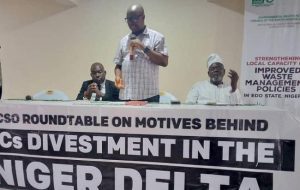Civil society organisations (CSOs) that converged on Benin City, the Edo State capital on Friday, May 27, 2022, have warned that the current model of divestment by International Oil Companies (IOCs) operating in the Niger Delta will cause local communities to lose economic power.

They drew the conclusion at a Civil Society Roundtable on IOC Divestment from the Niger Delta organised by the Environmental Rights Action/Friends of the Earth Nigeria (ERA/FoEN).
Some of those that spoke at the convening include Friday Ogierakhi, former Edo State House of Assembly member, and Prince Barbs Pawuru, president of the Host Communities Network of Nigeria (HOCON).
Ogierakhi described divestment by the IOCs as a strategy of using and dumping of the people of the oil-bearing communities and their environment, adding that the decisions of the oil firms to leave the region without remediating for oil pollution was tantamount to sucking the juice from a fruit and leaving the chaff behind.
Ogierakhi revealed that his own community is a victim of the divestment process which left the environment degraded and the natives poorer than when oil was first struck in commercial quantities.
He said: “Interrogating the issues is about accountability in the oil mineral industry. If you must divest, there must be something in return for the people for all that you have taken away.”
In a similar vein, Pawuru noted that the joint venture agreements between the Nigerian government and the IOCs is better described as profit sharing without accountability and responsibility to the local communities.
He revealed that the IOCs are divesting because they no longer find the onshore fields productive, adding, “Now they are leaving those fields to the domestic oil companies that do not even have capacity to manage the crisis brewing in the region.”
Pawuru also disclosed that the current divestment exercises are skewed against locals and would lead to more oil theft and marine pollution.
He insisted that if at all the government wants to allow divestment in the oil sector, there should be a guaranteed process of reclaiming the environment and restoring it to how it was before the divesting entities began operations.
Earlier, ERA/FoEN Executive Director, Chima Willaims, said that the Roundtable on divestment was a continuation of a process that ERA had commenced to interrogate the reasons the IOCs “suddenly started a divestment process that is leading to sale of their (IOCs’) entire onshore assets and their going to the deep offshore where their activities are not adequately monitored”.
Williams noted that Nigeria would be the greatest loser “if we allow these divesting multi-national companies to leave behind the mess they have created, which they are selling off to our brothers and sisters in the domestic operations who do not have the financial and technical strengths to engage and recover our environment. Allowing this to happen will mean double jeopardy and punishment for Nigerians.”
